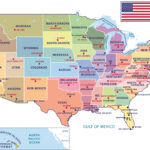The ACR joined with 52 organizations in thanking House and Senate leaders for introducing the Healthcare Workforce Resilience Act, which would support employment-based visas for international physicians and nurses.
Spring 2024 State Legislative Update
The ACR is actively monitoring more than 60 pieces of legislation, focusing on such key issues as copay accumulators, utilization management reform, gold card programs and other emerging concerns. Two states have passed utilization management reform bills this year.

Gwenesta B. Melton, MD, Appointed New Chair of Affiliate Society Council
Gwenesta B. Melton, MD, wears many hats as a rheumatologist, teacher and champion for advocacy and collaboration. She has been involved with the ASC for more than a decade.
Congressional Action Partially Addresses Medicare Cuts
The newest funding package reduces the latest cut to Medicare reimbursement from 3.4% to 1.68%. Although rheumatologists are faring better under Medicare in 2024, broader reforms remain the ACR’s highest priority regarding Medicare payments to physicians.
RheumPAC’s Role in the ACR’s Advocacy Efforts
In an election year, it is critical that the ACR’s non-partisan political action committee be well positioned to support our congressional champions. Learn more about RheumPAC and its role in the ACR’s advocacy efforts.
Updates from the ACR Insurance Subcommittee
The Insurance Subcommittee is working to address coverage and reimbursement challenges facing rheumatology practices, including issues related to biosimilar use, in-office treatments and the new G2211 code.

The ACR Gets Rheumatologists Paid More
The implementation of the new G2211 code on Jan. 1 increases reimbursement for rheumatology visits, but the ACR continues to fight for retroactive repayment of the across-the-board Medicare physician reimbursement cuts implemented at the same time, as well as structural changes to the program to make serving Medicare patients sustainable for rheumatologists in the long term.

2024 State Legislative Preview
With state legislatures now in session, the ACR is working with our partners to ensure that the voice of the rheumatology community is heard. Here is a look at some of the bills we are monitoring and the trends we expect to play out over the 2024 legislative calendar.
Support RheumPAC to Keep Rheumatology in Healthcare Policy Conversations
2024 is an election year, which means it is more critical than ever that RheumPAC is well equipped to support campaigns and take part in important healthcare discussions on Capitol Hill.
The ACR Advocates for G2211 Reimbursement under Medicare Advantage & Commercial Plans
The ACR is reaching out to Medicare Advantage and commercial payers to ensure appropriate reimbursement for the new complex care add-on code, G2211, implemented for outpatient office visits starting Jan. 1, 2024.
- « Previous Page
- 1
- …
- 10
- 11
- 12
- 13
- 14
- …
- 96
- Next Page »